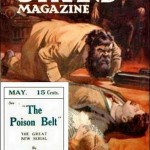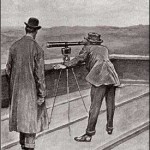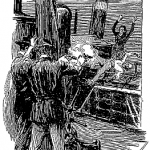“Aye. He’d go lolloping about in the Channel if there was any fog on, steering for the lights o’ any steamers or headin’ round for all the fog whistles if it was too thick to see. Sooner or later, as sure as fate, he’d get cut down to the water’s edge. Lor’, it was a fine game! Half a ‘yard o’ print about his noble conduc’ in the newspapers, and maybe a leader about the British tar and unexpected emergencies. It once went the length o’ a subscription. Ha! ha!” Miggs laughed until he choked.
“And what became of this British star?” asked the German.
“He’s still about. He’s in the passenger trade now.”
“Potztausand!” Von Baumser ejaculated. “I would not go as a passenger with him for something.”
“There’s many a way that it’s done, sir,” the mate added, filling up his glass again, and passing the bottle to the captain. “There’s loadin’ a cranky vessel wi’ grain in bulk without usin’ partition boards. If you get a little water in, as you are bound to do with a ship o’ that kind, the grain will swell and swell until it bursts the seams open, and down ye go. Then there’s ignition o’ coal gas aboard o’ steamers. That’s a safe game, for nobody can deny it. And there are accidents to propellers. If the shaft o’ a propeller breaks in heavy weather it’s a bad look-out. I’ve known ships leave the docks with their propellers half sawn through all round. Lor’, there’s no end o’ the tricks o’ the trade.”
“I cannot believe, however,” said Tom stoutly, “that Mr. Girdlestone connives at such things.”
“He’s on the waitin’ lay,” the seaman answered. “He doesn’t send ’em down, but he just hangs on, and keeps his insurances up, and trusts in Providence. He’s had some good hauls that way, though not o’ late. There was the Belinda at Cape Palmas. That was five thousand, clear, if it was a penny. And the Sockatoo—that was a bad business! She was never heard of, nor her crew. Went down at sea, and left no trace.”
“The crew too!” Tom cried with horror. “But how about yourselves, if what you say is true?”
“We are paid for the risk,” said both the seamen, shrugging their shoulders.
“But there are Government inspectors?”
“Ha! ha! I dare say you’ve seen the way some o’ them do their work!” said Miggs.
Tom’s mind was filled with consternation at what he had heard. If the African merchant were capable of this, what might he not be capable of? Was his word to be depended on under any circumstances? And what sort of firm must this be, which turned so fair a side to the world and in which he had embarked his fortune? All these thoughts flashed through his mind as he listened to the gossip of the garrulous old sea dogs. A greater shock still, however, was in store for him.
Von Baumser had been listening to the conversation with an amused look upon his good-humoured face. “Ah!” said he, suddenly striking in, “I vill tell you something of your own firm which perhaps you do not know. Have you heard dat Mr. Ezra Girdlestone is about to be married?”
“To be married!”
“Oh yes; I have heard It dis morning at Eckermann’s office. I think it is the talk of the City.”
“Who’s the gal?” Miggs asked, with languid interest.
“I disremember her name,” Von Baumser answered. “It is a girl the major has met—the young lady who has lived in the same house, and is vat they call a warder.”
“Not—not his ward?” cried Tom, springing to his feet and turning as white as a sheet. “Not Miss Harston? You don’t tell me that he is going to marry Miss Harston?”
“Dat is the name. Miss Harston it is, sure enough.”
“It is a lie—an infamous lie!” Tom cried hotly.
“So it may be,” Von Baumser answered serenely. “I do but say vat I have heard, and heard more than once on good authority.”
“If it is true there is villainy in it,” cried Tom, with wild eyes, “the blackest villainy that ever was done upon earth. I’ll go—I’ll see him to-night. By heavens, I shall know the truth!” He rushed furiously downstairs and through the bar. There was a cab near the door. “Drive into London!” he cried; “69, Eccleston Square. I am on fire to be there!” The cabman sprang on the box, and they rattled away as fast as the horse would go.
This sudden exit caused, as may be imagined, considerable surprise in the parlour of the Cock and Cowslip.
“He’s a vera tumultuous young man,” the mate remarked. “He was off like a clipper in a hurricane.”
“I perceive,” said Von Baumser, “dat he has left his hat behind him. I do now remember dat I have heard his name spoken with dat of dis very young lady by my good vriend, the major.”
“Then he’s jealous belike,” said Hamilton Miggs, with a knowing shake of the head. “I’ve felt that way myself before now. I rounded on Billy Barlow, o’ the Flying Scud, over that very thing, twelve months ago come Christmas. But I don’t think it was the thing for this young chap to cut away and never say ‘With your leave,’ or ‘By your leave,’ or as much as ‘Good night, gentlemen all.’ It ain’t what you call straight up an’ down.”
“It’s transcendental,” said the mate severely; “that is what I call it.”
“Ah, my vriends,” the German put in, “when a man is in love you must make excuses for him. I am very sure dat he did mean no offence.”
In spite of this assurance Captain Hamilton Miggs continued to be very sore upon the point. It was only by dint of many replenishings of his glass and many arguments that his companions could restore him to his pristine good humour. Meanwhile, the truant was speeding through the night with a fixed determination in his heart that he should have before morning such an understanding, one way or the other, as would never again leave room for a doubt.




